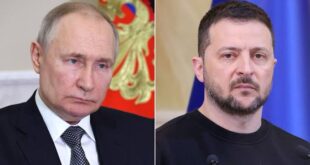
A South Korean court on Tuesday, December 31, approved an arrest warrant for President Yoon Suk Yeol, the embattled leader who plunged the country into political chaos with his shock decision to declare martial law nearly a month ago.
It is the first time a sitting South Korean president has faced an arrest warrant and the dramatic new showdown comes the same day extraordinary new details emerged of the night Yoon tried to close down the parliament.
Yoon was stripped of his presidential powers after South Korea’s parliament voted to impeach him earlier this month after some members of his own ruling party turned on him following his refusal to resign over the December 3 martial law decree.
South Korea’s anti-corruption agency said the Seoul Western District Court granted the warrant on Tuesday for Yoon on charges of abuse of authority and orchestrating a rebellion.
The arrest warrant was issued after Yoon had refused to answer three summonses by investigators in recent weeks asking for his cooperation, according to the Corruption Investigation Office (CIO).
Yoon is wanted for questioning in multiple investigations, including accusations of leading an insurrection.
On Monday, December 30, South Korean law enforcement officials requested the warrant. The president’s lawyer, Yoon Kab-keun, called the issuance of an arrest warrant “illegal and invalid,” while speaking to reporters Tuesday.
“It’s a warrant request from an agency that’s clearly not authorized by law, and the warrant request process was not transparent,” Yoon said, referring to the request made by the CIO.
An arrest warrant must usually be executed within seven days but can be extended, according to the CIO.
Previously, South Korean law enforcement officers tried but failed to successfully raid the presidential office as part of the investigation due to blocks by the president’s security team, despite having a search warrant.
The presidential security team said Tuesday that “security measures will be taken in accordance with due process.”
As investigators dig further into the president’s actions the night he declared martial law, new allegations are emerging about what exactly happened during those six hours before the motion was rescinded.
Yoon ordered troops to South Korea’s parliament as lawmakers scrambled to block the martial law order with a parliamentary vote. As soldiers attempted to enter the main hall of the National Assembly, lawmakers erected barricades using chairs and other furniture to stop them from entering.
In a 10-page summary from the former defence minister’s prosecution indictment report on Friday, Yoon had allegedly instructed the military to use firearms to break the doors, if necessary, to remove lawmakers gathering inside the main chamber.
“Haven’t you entered yet? What’s taking so long? Break down the doors and drag them out!” Yoon allegedly said, according to the prosecution summary.
“Shoot the doors to break in and remove them,” the document quoted the president saying.
In the early hours of December 4, lawmakers swiftly voted to block the decree, with 190 of the 300 members of parliament voting to overturn the measure – after which the soldiers withdrew.
But, according to the prosecution, the president vowed to declare martial law three times if necessary.
The former defence minister Kim Yong-Hyun allegedly ordered his commander to prioritize apprehending key figures, such as main opposition Democratic Party leader Lee Jae-myung, National Assembly Chairman Woo Won-shik, and ruling People Power Party leader Han Dong-hoon, just before the martial law was cut off.
The former defence minister, who was arrested earlier this month, has been indicted for abuse of power and serving as a key figure in the insurrection operation, the statement said.
Yoon has largely stayed away from public light in recent weeks as he also faces a Constitutional Court trial on whether he will be formally removed from the presidency or reinstated in office – a process that could take up to six months.
The court held its first pretrial hearing on December 27, which Yoon was not in attendance. His presence is not mandatory.
The court has vowed to take the case as a “top priority” along with other impeachment cases the opposition has pushed for against Yoon’s administration, including the justice minister, prosecutors and other senior officials.
The nine-member court currently only has six justices, due to a delay in filling vacancies left by retired justices, further complicating matters. However, on Tuesday acting president Choi Sang-mok said he would appoint two justices immediately, and appoint a third justice when the ruling and opposition parties agree.
A second pretrial hearing for Yoon is scheduled for Friday.
Yoon has been banned from leaving the country and top officials from his government have also been arrested and indicted on allegations of insurrection.
 topnaijanews Stay informed with the latest Nigerian news at your fingertips
topnaijanews Stay informed with the latest Nigerian news at your fingertips
